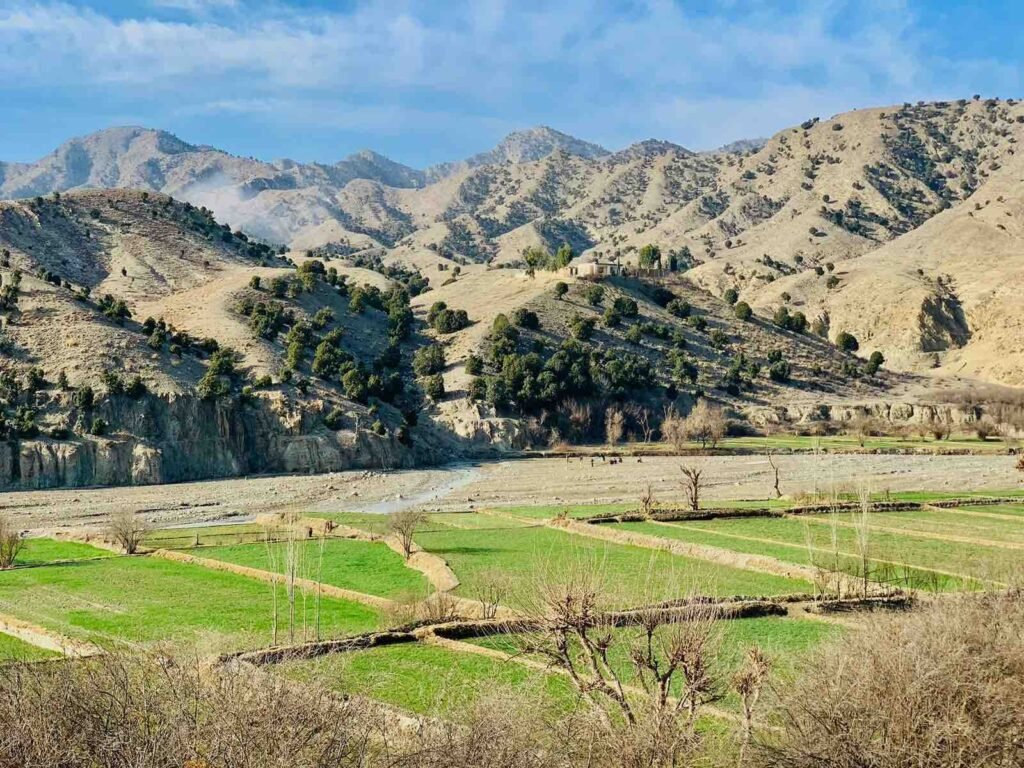From Allies to Adversaries: The Growing Rift in Pakistan – Afghan Taliban relations

Khost province along the Durand Line. Photo by @AADIL for ADN.
By A. Shafaq
The relationship between Pakistan and the Afghan Taliban has been rapidly deteriorating over the past few years, and there appears to be no sign of reconciliation or improvement in the near future. Both sides, once allies, have increasingly found themselves at odds, with deep-rooted political and security concerns driving a growing wedge between them. What was once a cooperative dynamic, particularly after the Taliban’s return to power in Afghanistan in August 2021, has now devolved into mutual distrust, blame games, and diplomatic standoffs. This deterioration has profound implications for regional stability and the shared security challenges both nations face.
A significant recent incident that has underscored the deteriorating relations between the two neighbors occurred in Peshawar, Pakistan. Afghan Consul General Hafiz Mohibullah Shakir and his colleague refused to stand for Pakistan’s national anthem during the Rehmat-ul-Alameen Conference, an event hosted by Khyber-Pakhtunkhwa’s Chief Minister. This diplomatic slight was widely condemned in Pakistan, with experts and officials alike calling for Shakir to be declared persona non grata. Such a breach of diplomatic decorum is viewed not just as disrespectful, but as a reflection of the underlying animosity brewing between Kabul and Islamabad.
The Afghan consulate defended Shakir’s actions, citing religious reasons, specifically objecting to the use of music in the national anthem. However, this defense has done little to quell the outrage in Pakistan, where calls for a formal diplomatic démarche have intensified. This symbolic act of defiance speaks volumes about the strained diplomatic ties between the two nations.
At the core of the tensions lies Pakistan’s accusation that the Afghan Taliban harbors and provides refuge to the Tehreek-e-Taliban Pakistan (TTP), a militant group responsible for a string of attacks on Pakistani soil. Despite repeated requests from Islamabad to crack down on the TTP, the Taliban administration in Kabul has largely resisted taking decisive action, urging Pakistan instead to seek a political solution to the TTP threat.
Pakistan’s frustration has grown, especially since the country’s military leadership changed course in late 2022, declaring that there would be no further negotiations with terrorist groups like the TTP. This shift in policy has only escalated tensions, as attacks on Pakistani soil have increased in frequency, with Islamabad laying the blame squarely on Kabul for its failure to rein in the TTP. The Afghan Taliban, for its part, denies that it provides any sanctuary for the TTP and insists that the group operates solely within Pakistani borders.
This back-and-forth has worsened bilateral relations, with both nations hardening their stances. Pakistan’s military, through its Public Relations Department (ISPR), has accused Afghanistan of being a safe haven for militants launching cross-border attacks, a claim Kabul has consistently denied. These allegations and counter-allegations have created an environment of mistrust, making any meaningful cooperation on security issues unlikely in the foreseeable future.
Rising Tensions Over Afghan Refugees
In addition to the security concerns, Pakistan’s treatment of Afghan refugees has become another major point of contention. Pakistan has hosted millions of Afghan refugees for decades, many of whom fled the Soviet invasion and subsequent civil war. However, the current government’s policy toward these refugees has taken a harsh turn, with plans to deport hundreds of thousands of Afghans, including those holding Afghan Citizen Cards (ACC). This move has drawn criticism from both humanitarian organizations and the Afghan government, which views the mass deportations as a violation of international human rights norms.
The Afghan Taliban has vocally opposed Pakistan’s actions, accusing Islamabad of exacerbating the humanitarian crisis by forcing refugees to return to an already war-torn country struggling to rebuild. The refugee issue has only added to the diplomatic deadlock, as Pakistan justifies the deportations by citing security concerns, particularly the alleged involvement of Afghan refugees in terror attacks—a claim for which it has provided little concrete evidence.
The strained political and security relations between Pakistan and the Afghan Taliban are also manifesting in the economic realm. Historically, Pakistan has been Afghanistan’s primary trading partner, but recent years have seen a dramatic decline in trade volumes, dropping from $4 billion to under $1 billion. In contrast, Afghanistan has sought to diversify its economic partnerships, notably by strengthening ties with Iran and India, two of Pakistan’s regional rivals.
The Taliban’s investment in Iran’s Chabahar Port, a strategic maritime hub, marks a significant shift in Afghanistan’s economic policy. By developing alternative trade routes through Iran, Afghanistan is signaling its intent to reduce its dependence on Pakistan, a move that has the potential to further deepen the rift between the two countries. This pivot also aligns Afghanistan more closely with India, a country that has historically had tense relations with Pakistan.
Durand Line Dispute Escalates Tensions
Adding to the complexity of Afghan-Pakistan relations is the long-standing dispute over the Durand Line, the de facto border between the two nations. Afghanistan has never recognized the Durand Line as an official border, and Pakistan’s ongoing efforts to fence the border have been met with strong opposition from Kabul. The Taliban government views the fencing as a violation of Afghan sovereignty, while Pakistan argues that it is necessary to curb cross-border terrorism.
Clashes along the border have become more frequent, with both sides engaging in retaliatory strikes that underscore the volatility of the situation. The Durand Line dispute, coupled with the other political, security, and economic disagreements, leaves little room for optimism when it comes to the future of Afghan-Pakistan relations.
The relationship between Pakistan and the Afghan Taliban is in a downward spiral, with little indication that either side is willing to compromise or seek common ground. From security concerns involving the TTP to the refugee crisis, economic realignment, and territorial disputes, the issues driving this rift are complex and deep-seated. Unless both nations make a concerted effort to address these challenges through dialogue and cooperation, the prospect of improved relations remains bleak, and the fallout from this deteriorating relationship could have lasting consequences for the broader region.
A. Shafaq (pseudonym) is a researcher and lecturer at one of the private universities in Kabul.
Note: The contents of the article are of sole responsibility of the author. Afghan Diaspora Network will not be responsible for any inaccurate or incorrect statement in the articles.






